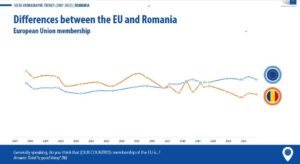
Is Romania becoming an anti-European country? How we ended up on the brink of disaster. Who’s taking us out of the EU orbit
Romania is no longer an enthusiastically pro-European country. In Romania, the Euro-sceptic stance among the population, encouraged by much of the press and politicians, has become critical. Two opinion polls confirm this dangerous anti-EU trend. Unfortunately, we do not have a public debate about the worrying change of strategic orientation. This is the worst news in years, and it will not go without consequences. But politicians surely see it and will act accordingly.
Urmărește cele mai noi producții video G4Media
- articolul continuă mai jos -
A first survey was recently released by the European Parliament.
The Eurobarometer shows that only 46% of Romanians today believe that Romania’s membership of the European Union is a good thing, compared to 62% of the European average. It should be stressed that we do not know whether the remaining 54% believe en masse that EU membership is a bad thing or whether we have a significant percentage of undecided among them. One thing is certain: the Euro-enthusiast camp is no longer a critical mass; on the contrary, it has become significantly thinner in recent years.
A second poll was cited by the head of the European Commission Delegation in Bucharest, Ramona Chiriac, during a conference organized by the G4Media.ro. According to the survey, 47% of Romanians, compared to 52% of the EU average, say they trust the European institutions. Here again, we can see how Romanians who do not trust or are skeptical about the European institutions make up a critical mass, i.e. 53% of the population.
Why has Romanians’ trust in the EU plummeted in the last three years, while the European trend is in the opposite direction? Why has the European average risen by a few percentages, while in Romania confidence in the EU has fallen by half?
If we analyze the Eurobarometer data released ten days ago, we see that in 2015 the number of Romanians who said that EU membership is a good thing was significantly higher, 68%, compared to the EU average of 54% at the time. So we are looking at a dramatic drop in Romanians’ confidence in the EU of around 20 percentage points in just eight years!

From the graph above, it appears that Romanians’ trust in the EU plummeted with the onset of the pandemic, when Brussels introduced strict travel rules conditional on vaccination. According to the survey, in 2020 Romania was still within the European average, but over the past three years the fall in trust in the EU has accelerated in Romania, while trust is rising on average in other EU countries.
At Monday’s G4Media.ro conference on the main anti-EU issues, we tried to identify the causes of the collapse of Romanians’ trust in the EU. We only talked about a few main causes, but in reality the explanation of Romanian Euro-skepticism is much more complex. I will try to summarize below in points, what has gradually taken Romania out of the European orbit.
- The anti-EU and anti-European narrative aggressively promoted by the Dragnea regime for almost 3 years (December 2016 – November 2019), which programmatically followed a Viktor Orban-type nationalist line. The regional contamination is not to be neglected.
- The emergence and growth of the far-right AUR party from 2020 onwards, with vehemently anti-European, anti-Western and primitive-nationalist discourse.
- Anti-vaccinationist discourse, of which the AUR has made a main campaign theme and organized street protests, the restrictions adopted during the pandemic (wearing masks, limiting freedom of movement), have massively eroded trust in the EU.
- According to an Avangarde poll commissioned by G4Media, to the question „Do you think the vaccines and the anti-COVID vaccination strategy have been beneficial for people’s health?”, only 36% answer with Yes, 58% say NO.
- The major reforms introduced in the NRRP call into question, among others, the reform of special pensions. Large categories of pensioners (magistrates, military, former secret service officers) stand to lose a lot of money. The debate has been going on for years, and politicians are reluctant to reform a deeply unfair pension system. In populist fashion, they always point the finger at Brussels: the EU wants to cut special pensions, not us! Another major source of Euro-skepticism.
- Sovereigntist and anti-European discourse has made critical mass even in the judiciary. In June 2021, the Constitutional Court issued a decision denying the supremacy of European law over national law. There are few judges who have the courage to ignore the CCR’s decision or to turn to the CJEU to apply European law over domestic law.
In their populism, Romanian politicians always present the European Union as an ATM: European money is good, its rules and reforms are bad. They want Schengen, but with all the corruption in the police stations, politics and administration. - The anti-EU discourse promoted by big farmers in agriculture. Here we add another big source of Euro-skepticism, the conspiracy discourse, on food. According to the Avangarde poll commissioned by G4Media.ro, 33% agree with the statement „Brussels is forcing us to eat insects” and only 50%, so at the limit, think it is a propaganda tool against the European Union.
- Anti-EU internal and external propaganda programmatically disseminated by some news channels. Romania TV, Antena 3 or Realitatea circulate the classic anti-European narratives: Romania, a Western colony, a market for the big Western companies, a second-hand country, plundered of its natural resources, etc.
- Sources of the anti-EU narrative are also a series of controversial or unpopular decisions taken in Brussels itself: banning the sale of cars with thermal engines from 2035 is not likely to go down well in a poor country like Romania, nor is the closure of mines, the abandonment of fossil fuels and the forced transition to green in a country far behind.
- The latest corruption scandals that have hit the European Parliament in full force add to the discourse so widespread in Romania, which has become commonplace: everyone steals, hence the chronic lack of trust in institutions.
These are just some of the major sources of Euroscepticism. There are certainly others, external factors, Russian propaganda, the energy crisis, the list remains open, but the most important are those listed above.
All together, this makes Romania a somewhat more vulnerable state than other European states, a state that has gradually slipped in recent years from the camp of pro-European states into the group of Euro-sceptic states alongside Poland and Hungary.
Why have the above narratives caught on more in Romania than elsewhere?
For one thing, Romania is among the countries with the highest degree of functional illiteracy in the EU. Many people are unable to understand correctly what they read or hear.
On the other hand, nobody has done anything to shut down the big anti-EU fans. On the contrary, they have been quietly or openly funded and encouraged by the power establishment (government, parties, services). The National Broadcasting Council has debunked hundreds of lies told daily for years on some TV and radio stations. The penalties imposed have been ridiculous.
This dramatic change of direction should be a matter of national security. But I fear that the very people who could have prevented Romania’s pro-European course from changing are among the beneficiaries of the new realities.
The power system (the two big parties plus a significant part of the security complex, the services plus the army) has never looked favourably on the surrender of sovereignty that further integration entails. The surrender of sovereignty comes with less power.
Then, the reforms imposed by Brussels essentially mean more transparency, less arbitrariness in the spending of the billions of euros of PNRR and less room for rigged bids and under-the-table deals.
Who wants that in Romania? Hardly anyone in the major parties. The best proof of this is the whistleblower law, which they mutilated so they could steal in peace, even at the risk of losing the second €3.2 billion tranche of the NRRP. They fixed the law belatedly and only under the threat of cutting the second tranche.
In conclusion, Romania did not join the ranks of the Eurosceptic countries by chance. It has been for years and is still state policy, but not in plain sight, sometimes in plain sight, sometimes under the table.
And the state and a good part of its citizens display a high degree of hypocrisy. The benefits of the EU are all very well (money, freedom of movement, jobs), but let’s not hear about reforms, rules, fiscal discipline.
Let Brussels leave us alone with our special pensions, our corruption and our controlled justice, our intelligence services running the country and our falsified democracy, otherwise we will all shout in chorus: Down with the EU!
Translated

Donează lunar pentru susținerea proiectului G4Media
Donează suma dorită pentru susținerea proiectului G4Media
CONT LEI: RO89RZBR0000060019874867
Deschis la Raiffeisen Bank



1 comentariu